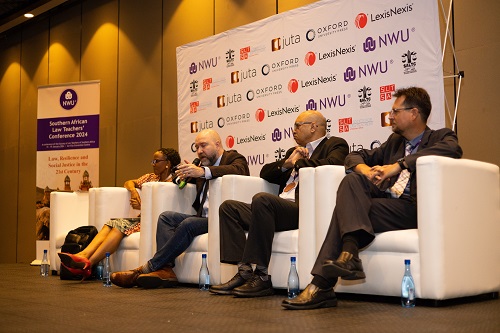In an inequitable world, achieving social justice is central to bringing about a better world. We need a new breed of legal leaders ready to make the law in all its fields and services more accessible to people.
At the Southern African Law Teachers’ Conference it became clear that a strong sense of responsibility regarding social justice will rest on the shoulders of tomorrow’s members of the legal fraternity. This is especially true when dealing with issues such as alleviating poverty, fighting crime and corruption, and making a sustainable transition to renewable energy to curb load-shedding and global warming and to safeguard the environment.
The new champions of justice will have to be resilient, embrace technology and be active participants as new avenues and opportunities arise.
Shaping legal leaders for tomorrow
“It is a new, complex world and we need to adapt, especially when it comes to the training of our graduates. The bottom line is that we all have a responsibility to social justice and the environment we find ourselves in,” says advocate René Koraan, one of the organisers of the conference.
She explains that one major challenge for law lecturers comes from artificial intelligence (AI). It has a profound impact on teaching and learning, affecting how students learn, conduct research and interact. “It can be a powerful tool to achieve an excellent calibre of students in the field of law.”
René says the power of AI in accessing and digesting information can play a significant role in the academic careers of students.
The conference brought together specialists, members of the legal fraternity and law lecturers from major universities in southern Africa.
Among the speakers were the Minister of Justice and Correctional Services, Ronald Lamola, the Judge President of the North West Division of the High Court, Justice Ronald Hendricks, and Justice Bess Nkabinde.
The Faculty of Law at the North-West University (NWU) hosted the conference from 15 to 19 January at the Sun City Convention Centre.
“This year’s theme: Law, Resilience and Social Justice in the 21st Century, was broad enough to offer something for every attendee,” says René.
The conference featured sessions in the various legal fields, ranging from constitutional, customary, private, environmental and cyber law to legal education, among other disciplines.
“It was a great honour for us to have hosted this conference. It was an excellent opportunity to contribute to the achievement of economic, racial and social justice for all,” says Dr Neo Morei, executive dean of the Faculty of Law.

The last plenary session investigated the influence, future and impact of artificial intelligence on teaching and learning. From the left are Prof Puseletso Letete from the University of Johannesburg, Prof Donrich Thaldar of the University of KwaZulu-Natal, Prof Daryl Balia, deputy vice-chancellor for Information Technology and Campus Operations (Potchefstroom Campus) at the NWU, and Prof Wian Erlank, also from the NWU.
